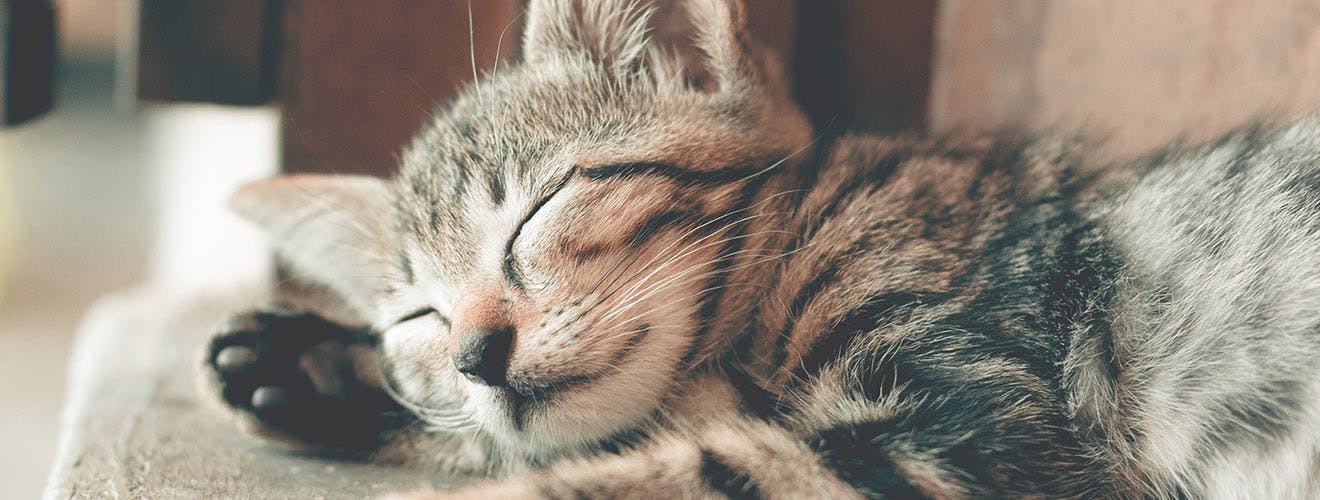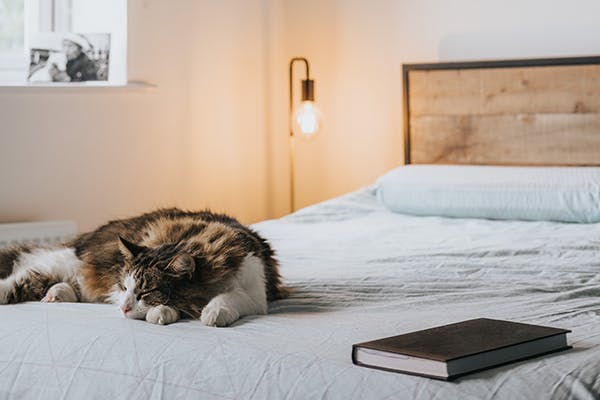Should I Let My Cat Sleep With Me?

Should I let my cat sleep with me? It's a question most cat owners struggle with. Sure, it's fun to snuggle with these furry little companions, but is it really something you want to do all night long? We're taking a deep dive into the subject, providing a few perks, and some drawbacks as well. Don't worry, we aren't telling you what to do with your four-legged friends; we're just keeping you informed.
Is It Weird To Let a Cat Sleep in Your Bed?
Not really. If sharing a bed with dogs is an accepted practice, why not cats? It’s a sign of trust and closeness for you both and more common than you might think. A report by the Centers for Disease Control and Prevention (CDC) says around 60% of cat pet owners in the United States allow their pets to sleep in bed with them.
Letting your pet share a bed with you has a range of benefits.... and sure, maybe a few cons. Let’s take a deeper look into what really happens when you bring the cat to bed.
Perks of Letting Your Cat Sleep in Bed
It Can Help Reduce Stress
Interacting with pets helps reduce anxiety. Just cuddling is known to release oxytocin, a feel-good hormone associated with lowering the stress hormone called cortisol. Having your cat in bed with you or your children could potentially lower stress levels and help the family fall asleep faster.
It Protects Against Loneliness
Loneliness can lead to anxiety, depression, and other mental health issues. Kittens keep us company and reduce feelings of isolation, symptoms of depression, anxiety, and stress. Love and affection from your fur baby promote bonding and a feeling of security.
It Helps You Feel Safe
Have any trouble sleeping at night? Sleeping with pets promotes a feeling of warmth, safety, and calm helping you fall asleep faster and easier.
Drawbacks to Letting Your Cat Sleep With You

Of course, we can't present all the benefits without providing a few drawbacks. Check out the list below for information on why you might want to sleep on your own.
Cats Don’t Operate on Our Sleep Schedule
Cats can doze off for up to 15 hours a day but are very active at night. If you wake up with the slightest noise or movement, you may not be able to get quality sleep with your pet around.
Additionally, many cats like to play with human feet under the covers. There may even be some scratching involved which can disturb the quality for you or your kids. Try to tire your cat out by playing with them a few hours before heading to bed. It might help prevent them from disturbing you in the middle of the night.
It Can Cause Allergies
Three out of every ten America have cat allergies. This can manifest in a number of ways, from difficulty breathing to a runny nose and nasal congestion to sneezing, and more.
If you suffer from asthma or have allergies that are triggered by cats, then you might want to avoid bringing them into bed. Depending on the severity of your medical condition, you may even want to shut your bedroom door before turning in to keep things from going south.
It Could Expose You To Harmful Bacteria
Cats can have illnesses that pose health risks to us, humans. Even if you bring your cat in for a visit to the vet, you still run the risk of infection.
Plus, spending up to eight hours a night with your cat will likely expose you to your pet’s excretions and secretions. Which is, admittedly, kind of gross.
The good news is if you have a healthy immune system, you have a pretty low risk of getting sick from your cat. Still, it can happen. Some common infections caused by cats include bartonellosis and salmonellosis.
In fact, cat-scratch fever and affects up to 12,000 people per year. Transmitted through the bite or scratch of an infected pet, it can cause fever, fatigue, swelling of the lymph nodes, and more, which can be potentially fatal for those with a weak immune system.
Salmonellosis is transmitted through contact with an infected feline’s feces. The litter box of cats may be a hotspot for bacteria, parasites, infections, and ticks.
Outdoor cats are prone to contracting salmonellosis since they spend so much time chasing and eating birds and other small animals. Allowing your cat to sleep in your bed can result in you contracting the disease, which can cause diarrhea, fever, and stomach pain in humans.
Conclusion
Dogs and cats have their own temperaments. If your pet doesn’t want to cuddle with you, respect their personal space. When it comes time to decide where they'll sleep, the decision is really up to you. But before making a choice, you should consider your health risks, sleeping habits, and your cat’s willingness to share your bed with you.
It’s also a good idea to have your pets checked by a vet before you let your cat sleep in the same bed.
If you're experiencing trouble sleeping for reasons that have nothing to do with your cat, consider trying sleep supplements from Sandland Sleep. They can help secure a full eight hours of sleep without the morning grogginess that usually accompanies sleeping aids.
The offers come with a 30-day good sleep guarantee for first-time buyers. If it doesn’t work for you, you can ask for a refund.
Sleeping with your feline and cozying up to them in your bedroom could be harmful to those with a weak immune system. And if your cat likes to snuggle with your baby, they’ll be exposed to the same risks. In addition to bringing in fleas, parasites, bacteria, and other diseases, your cat might cuddle a little too closely, and end up on its chest, head, or face.
When a cat sleeps on your bed with you, it’s because they feel safe and secure with you. If you’re wondering, do cats trust you if they sleep with you, the answer to that is a definite yes.
The risk of contracting a disease or exposure from sleeping with your furry friend all boils down to how well your immune system is functioning. If you are relatively healthly, your risk of getting sick from sleeping with your feline is low. However, if you have a weak or compromised immune system, you could potentially contract some dangerous diseases from letting your cat sleep in bed with you.
If not your bed, consider getting your pet a small bed of its own. Along with a litter box, food and water bowls, and a scratching post, a cat bed is one of the most useful accessories you can introduce.






